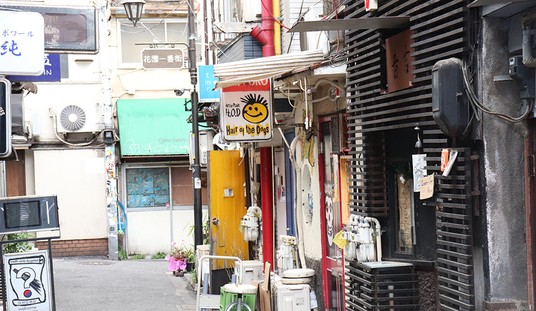If you haven’t read Utah Senator Mike Lee’s remarks [Bring Them In] at the Heritage Foundation’s Anti-Poverty Forum you really owe it to yourself to do so. It is probably the most succinct conservative critique of modern government anti-poverty programs in recent decades.
When President Lyndon Johnson declared an “unconditional war on poverty” in his 1964 State of the Union address it represented, arguably, the high water mark for the acceptance on liberal ideology in America. The essence of the speech was a singleminded devotion to the “the perfectability of man”: the notion that perfection can be achieved on Earth through the efforts of man, or in the case, the federal government. Never mind that some famous guy, his name escapes me at the moment, warned us all that the poor will always be with us.
As is so often the case, federal intervention becomes a self-licking ice cream cone where the resources earmarked for the eradication of poverty do little more than sustain the bureaucracy dedicated to eradicating poverty. And for good reason, if poverty ends so do the jobs associated with its eradication.
The outcomes have been dramatic and had they not been visited upon those at the margins of society would have resulted in long prison sentences for all involved. Instead of declaring a war on poverty, by Johnson’s actions he actually began the institutionalization of poverty and hopelessness as a lifestyle.
In his speech he contrasts how Abraham Lincoln and Lyndon Johnson addressed the problem of poverty:
In 1861, Abraham Lincoln told Congress that the “leading object” of American government was:
“to elevate the condition of men – to lift artificial weights from all shoulders, to clear the paths of laudable pursuit for all, to afford all an unfettered start and a fair chance, in the race of life.”
In a single sentence, Lincoln explains precisely what poverty is, and what government ought to do about it. As Lincoln knew first hand, true poverty was not for most people an absence of money, but an absence of opportunity – a lack of access to those social and economic networks where human opportunities are created. Then, as now, people were not isolated because they were poor – they were poor mostly because they were isolated.
And so, in America’s original war on poverty, government did not give the poor other people’s money. It gave them access to other people.
In Lincoln’s era – even during a cataclysmic war that was itself a struggle for human freedom and opportunity – that meant dredging rivers, building canals and cutting roads. It meant the Homestead Act and land-grant universities. These public goods weren’t designed to make poverty more tolerable – but to make it more temporary. They reduced the time it took to get products to market, increased access to banks and land, and increased the speed at which knowledge could be developed and shared.
Programs designed to provide cash subsistence and housing for the poor have created a series of perverse incentives that encourages poor mothers to not marry and to have children. The neighborhoods with high densities of subsidized housing are known by the technical term of “slum.”
Patients participating in Medicaid, the medical program for the poor, are 93% more likely to die of an ailment than patients with private insurance. Uninsured people are only 74% more likely to die.
Headstart is nothing more than a jobs program for mothers, mostly unwed, of the children participating. It has been studied for decades and is known to be, under a best case scenario, a null set. Any of the meager academic benefits of the program vanish within a year or two.
The casualty list goes on and on:
Today, many of those obstructions are themselves government policies. These policies unintentionally discourage almost every positive step underprivileged families can take toward social mobility and economic security.
Today’s government-centric system penalizes marriage, which a mountain of evidence now shows is the single most empowering social and economic opportunity there is. It also penalizes low-income workers for making more money by drastically reducing benefits at arbitrary points along the income-scale. Because of these poverty traps, single mothers near the poverty line, for instance, can face effective marginal tax rates of 80 or even 90 percent.
Thus, in poor communities, government dependence often atrophies community interdependence, fraying the bonds between moms and dads and neighbors and friends and pastors and teachers, old and young, native and immigrant.
Meanwhile, education policies leave low-income parents and children trapped in failing schools. Policies ranging from welfare to health care to criminal justice are only exacerbating the explosion of fatherlessness plaguing lower-income communities.
His critique of the direction the government has taken under Barack Obama is, if anything, understated:
Now, progressive ideologues reject all this. They do not trust individuals to join together voluntarily and organically to improve each other’s lives and meet common challenges. As President Obama said in his second inaugural:
“No single person can train all the math and science teachers we’ll need to equip our children for the future, or build the roads and networks and research labs that will bring new jobs and businesses to our shores. Now, more than ever, we must do these things together, as one nation and one people.”
But by “together,” of course, he meant only “government.”
This discredited mindset – which insists collective action can only mean state action – is itself a kind of poverty. It rejects social solidarity in favor of political coercion, and voluntary communities for professional community organizers. It distrusts and denies the bonds of cooperation and service that represent the highest expression of our dignity.
Look at any thriving marriage, friendship, church, charity, Little League, historical society, theater company, PTA, neighborhood or business. What makes America exceptional – and life worth living – is not simply individual freedom, but the heroic, empowering communities that free individuals form.
Free enterprise and civil society operate in the natural human space – between the isolated individual and the impersonal state – where we live, and love, and flourish… where everyone can earn a good living and build a good life… where the strong and the vulnerable alike can pursue their happiness, and find it… together.
There is a valid conservative critique to be made of social spending. It is demonstrated that it keeps the poor impoverished, it deters hard work, it encourages irresponsibility, and it passes poverty on from generation to generation. It is a condition that cannot be remedied by throwing ever increasing sums of money at a bureaucracy that relies upon poverty for its continued existence. It is not held to measurable and observable performance objectives because its chief product is making the liberal elite feel good about their beneficence… using your money.
We should not be afraid to address the shortcomings of the welfare state but we must acknowledge that those caught in this system aren’t the enemy, they are, as that famous guy said, the least of our brothers.













Join the conversation as a VIP Member